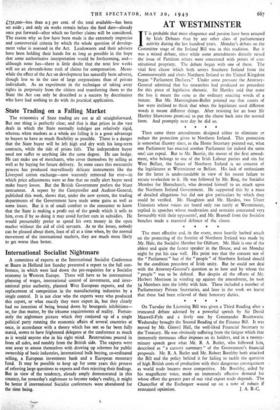AT WESTMINSTER
IT is probable that more eloquence and passion have been aroused by Irish Debates than by any other class of parliamentary activity during the last hundred years. Monday's debate on the Committee stage of the Ireland Bill was in this tradition. But it was a mixed debate, since while some amendments directly raised the issue of Partition others were concerned with points of con- stitutional propriety. The debate began with one of these. The vital first clause which both severs Southern Ireland from the Commonwealth and rivets Northern Ireland to the United Kingdom began "Parliament Declares." Under some pressure the Attorney- General admitted that his researches had produced no precedent for this piece of legislative rhetoric. Sir Hartley said that none the less it meant the same as the ordinary enacting words of a statute. But Mr. Manningham-Buller pointed out that courts of law were inclined to think that when the legislature used different words it meant different things. After resisting for an hour Sir Hartley Shawcross promised to put the clause back into the normal form. And promptly next day he did so.
* * i * _ Then came three amendments designed either to eliminate or reduce the protection given to Northern Ireland. This protection is somewhat illusory since, as the Home Secretary pointed out, what one Parliament has enacted another Parliament (or indeed the same one) can repeal. But to Mr. Beattie, the mover of the first amend- ment, who belongs to one of the Irish Labour parties and sits for West Belfast, the future of Northern Ireland is no concern of the legislatures at Westminster or Belfast. His lack of enthusiasm for the latter is understandable in view of his recent failure to secure re-election to it. He was followed by Mr. Bing, the Socialist Member for Homchurch, who devoted himself to an attack upon the Northern Ireland Government. He supported this by a mass of detailed allegations but did not give particulars by which they • could be verified. Mr. Haughton and Mr. Harden, two Ulster Unionists whose voices are heard only too rarely at Westminster, replied in speeches whose moderation and restraint contrasted very favourably with their opponents', and Mr. Bramall from the Socialist benches made a reasoned defence of the clause.
* * * *
The most effective and, in the event, most heavily barbed attack on the protecting of the frontier of Northern Ireland was made by Mr. Hale, the Socialist Member for Oldham. Mr. Hale is one of the ablest and quite the fastest speaker in the House, and on Monday night he put his case well. His point was that the consent not of the " Parliament " but of the " people " of Northern Ireland should be the condition precedent of Irish unity. But he could not deal with the Attorney-General's question as to how and by whom the " people " was to• be defined. But despite all the efforts of Mr. Herbert Morrison in winding up against the amendment, he took 54 Members into the lobby with him. These included a number of Parliamentary Private Secretaries, and later in the week we learnt that these had been relieved of their honorary duties.
* * * * On Tuesday the Licensing Bill was given a Third Reading after a truncated debate adorned by a powerful speech by Sir David Maxwell-Fyfe and a lively one by Commander Braithwaite. Wednesday brought the Second Reading of the Finance Bill. It was moved by Mr. Glenvil Hall, the well-liked Financial Secretary to the Treasury. He was obviously suffering from the fatigue which that immensely strenuous office imposes on its holders, and in a twenty- minute speech gave what Mr. R. A. Butler, who followed him, described as "a cursory summary" of the Government's financial proposals. Mr. R. A. Butler and Mr. Robert l3oothby both attacked the Bill and the policy behind it for failing to tackle the question of high British costs of production with their dangerous consequences as world trade became more competitive. Mr. Boothby, aided by his magnificent voice, made an immensely effective demand for whose effort the greater part of our vital export trade depends. The Chancellor of the Exchequer wound up on a note of robust if










































 Previous page
Previous page